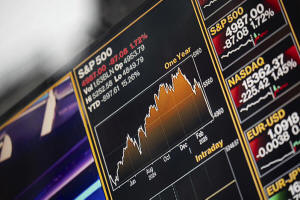Trump threatens more tariffs on China as global markets shudder over how
much pain economy can take
[April 08, 2025] By
CHRIS MEGERIAN and JOSH BOAK
WASHINGTON (AP) — Undeterred by a panicked stock market, President
Donald Trump threatened additional tariffs on China on Monday, raising
fresh concerns that his drive to rebalance the global economy could
intensify a financially destructive trade war.
Trump's threat came after China said it would retaliate against U.S.
tariffs he announced last week.
“If China does not withdraw its 34% increase above their already long
term trading abuses by tomorrow, April 8th, 2025, the United States will
impose ADDITIONAL Tariffs on China of 50%, effective April 9th,” Trump
wrote on Truth Social. “Additionally, all talks with China concerning
their requested meetings with us will be terminated!”
The U.S. president has shown few signs of backing down on tariffs
despite the mounting pressure in the financial markets. His commitment
to tariffs could have devastating effects for the global economy, even
though Trump is banking that it will ultimately pay off with
manufacturing jobs.
Asked Monday if he would consider a pause on his widespread tariffs,
Trump said, “We’re not looking at that.” The U.S. president said he was
open to negotiations “if we can make a really fair deal and a good deal
for the United States.” Trump added that it’s possible to have both
negotiated settlements with other countries and permanent tariffs.

Even as Israeli Prime Minister Benjamin Netanyahu said his country would
take its tariffs against U.S. goods to zero, Trump was noncommittal
about removing the new import taxes placed on an ally. The White House
also said Monday that Trump would veto a Senate bill that would mandate
congressional approval for new tariffs, a bet that the critical mass of
Republican lawmakers will loyally back him despite the economic and
political risks.
However, there are signs of frustration even among Trump’s allies. Sen.
John Kennedy, a Louisiana Republican, said he supports the president’s
goals of better trade deals but worries about the economic uncertainty.
“We don’t know if the medicine will be worse than the disease,” Kennedy
said, adding, “This is President Trump’s economy now.”
If Trump implements his new taxes on imports from China, U.S. tariffs on
Chinese goods would reach a combined 104%. The new taxes would be on top
of the 20% tariffs announced as punishment for fentanyl trafficking and
his separate 34% tariffs announced last week. Not only could that
increase prices for American consumers, it could also give China an
incentive to flood other countries with cheaper goods and seek deeper
relationships with other trading partners.
China responded angrily and said it would not back down.
“The U.S. threat to escalate tariffs on China is a mistake on top of a
mistake and once again exposes the blackmailing nature of the U.S.,"
said a statement from the Commerce Ministry in Beijing. "China will
never accept this. If the U.S. insists on its own way, China will fight
to the end.”
After sell-offs on the prior two days of trading, the Dow Jones
Industrial Average on Monday fell 0.9%. The S&P 500 slumped 0.2%, and
the Nasdaq composite was up 0.1%.
Trump frequently bragged about stock market gains during his first term,
and the threat of losses on Wall Street was viewed as a potential
guardrail on risky economic policies in his second term. But that hasn’t
been the case, and Trump has described days of financial pain as
necessary.
“I don’t mind going through it because I see a beautiful picture at the
end,” he said.

Trump officials have frequently appeared on television to make the case
for his policies, but none of their explanations have calmed the
markets. The only improvement came from a false report that top economic
adviser Kevin Hassett said Trump was considering a pause on all tariffs
except for China. Stock prices spiked before the White House denied it
was true by calling the post “fake news.”
The Republican president has remained defiant despite fears that he
could be pushing the U.S. toward a recession, insisting that his tariffs
are necessary for rebuilding domestic manufacturing and resetting trade
relationships with other countries.
But his aggressive push has scrambled U.S. economic policy. Even though
inflation remains elevated, Trump has called on the Federal Reserve to
lower its benchmark interest rates that were increased to constrain
price increases.
[to top of second column] |

A screen shows stock prices at the Nasdaq MarketSite, Monday, April
7, 2025, in New York. (AP Photo/Yuki Iwamura)

Federal Reserve Chair Jerome Powell warned Friday that the tariffs could
increase inflation, and he said, "There’s a lot of waiting and seeing
going on, including by us,” before any decisions would be made.
European Commission President Ursula von der Leyen said the European
Union would focus on trade with other countries besides the United
States, saying there are “vast opportunities” elsewhere.
Trump said he spoke with Japanese Prime Minister Shigeru Ishiba to start
trade negotiations. He complained on Truth Social “they have treated the
U.S. very poorly on Trade” and “they don’t take our cars, but we take
MILLIONS of theirs.”
Ishiba said he told Trump that he's “strongly concerned” that tariffs
would discourage investment from Japan, which has been the world’s
biggest investor in the U.S. in the past five years. He described the
situation as a “national crisis” and said his government would negotiate
with Washington to urge Trump to reconsider the tariffs.
White House trade adviser Peter Navarro suggested countries would need
to do much more than simply lower their own tariff rates to reach deals,
an indication that talks could be a drawn-out process.
“Let’s take Vietnam," he said on CNBC. “When they come to us and say,
‘We’ll go to zero tariffs,’ that means nothing to us because it’s the
non-tariff cheating that matters.”
Meeting with Trump at the White House on Monday, Netanyahu said his
country would remove tariffs and other trade barriers in response to the
U.S. placing 17% taxes on imports from Israel.
“Israel can serve as a model for many countries who ought to do the
same,” Netanyahu told the U.S. president.
Trump said he appreciated “very much” what Netanyahu had said. But when
asked if he would remove the tariffs, Trump said “maybe not” because of
the aid that the United States provides to Israel. The U.S. had a $7.4
billion trade deficit in goods last year with Israel, according to the
Census Bureau.

Trump has strived for a united front after the chaotic infighting of his
first term. However, the economic turbulence has exposed some fractures
among his supporters.
Bill Ackman, a hedge fund manager, assailed Commerce Secretary Howard
Lutnick on Sunday as “indifferent to the stock market and the economy
crashing.”
On Monday, Ackman apologized for his criticism claiming that Lutnick,
previously the head of the financial firm Cantor Fitzgerald, could
benefit from the tariffs because of its bond investments. But the hedge
fund manager also reiterated his concerns about Trump’s tariffs.
“I am just frustrated watching what I believe to be a major policy error
occur after our country and the president have been making huge economic
progress that is now at risk due to the tariffs," he wrote on X.
Billionaire Elon Musk, a top adviser to Trump on overhauling the federal
government, expressed skepticism about tariffs over the weekend. Musk
has said that tariffs would drive up costs for Tesla, his electric
automaker.
“I hope it is agreed that both Europe and the United States should move
ideally in my view to a zero tariff situation, effectively creating a
free trade zone between Europe and North America,” Musk said in a video
conference with Italian politicians.
Navarro later told Fox News' “Sunday Morning Futures” that Musk “doesn’t
understand” the situation.
“He sells cars,” Navarro said. “That’s what he does.” He added, “He’s
simply protecting his own interests as any businessperson would do.”
___
Associated Press writers Didi Tang and Stephen Groves in Washington and
Mari Yamaguchi in Tokyo contributed to this report.
All contents © copyright 2025 Associated Press. All rights reserved |